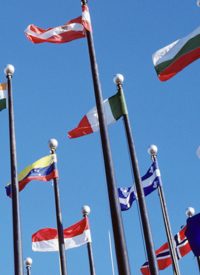
The foundation of the regional union continues to appear unstable. But even as riots, protests, and economic malaise rock the continent’s periphery, the governing entity is quickly collecting for itself all of the attributes traditionally associated with a nation state — a population, borders, currency, flag, anthem, passport, and more.
The next logical step, of course, is official recognition by the UN. And so, earlier this month, the UN General Assembly adopted a resolution giving the EU an official “voice” at the international institution. The move allows the European entity to present proposals and amendments, intervene during Assembly sessions, participate in debates and more.
The EU still does not have a vote, however. And it cannot nominate its own candidates for the Secretary General position. But top “eurocrats,” as they’ve become known, celebrated the move nonetheless.
“Thanks to this resolution, the EU achieves an important recognition as a global actor at the United Nations,” said European “President” Herman Van Rompuy in a statement. “I thank the UN membership for the overwhelming support for the resolution.”
Almost immediately following the General Assembly news, the European “Parliament” voted overwhelmingly to seek a seat for the continental entity on the five-member Security Council. The text of the resolution states: “In keeping with the purposes of the Lisbon Treaty in enhancing EU foreign policy and the role of the EU in global peace, security and regulation, that an EU seat in an enlarged UNSC remains a central, long-term goal of the European Union.”
And while the EU’s foreign-policy boss insists there are no current plans to pursue the measure, Parliamentarians say the vote represents the first step. And a lot of them, along with EU critics, are speaking out.
If the plan were to move forward, it would have enormous implications for Europe and the world body. There are currently already two veto-wielding EU members on the permanent Security Council: the U.K. and France. If the European super-state obtained a seat, it is possible that the British and French governments would eventually have to go. And that, say opponents, is unacceptable.
"The EU ambition is to create a state called ‘Europe’ and every move is a step in this direction,” charged leading U.K. Conservative MEP Geoffrey Van Orden, who said the institution was using “small steps” to advance its agenda. "We need to be constantly vigilant and active to prevent this. The U.K. seat on the UN security council is recognition of our historic power and influence as a nation, of the great contribution that Britain has made to our modern world, and of our continuing influence in world affairs.”
Van Orden told TheParliament.com that the move needs to be opposed. "Allowing others to speak on our behalf at the UN would be recognition and acceptance of continued decline in the world,” he said. “Instead of rolling over, we need to act to reverse this trend." Plenty of his Tory colleagues agreed, saying the move was an attack on sovereignty and national independence.
The U.K. Independence Party (UKIP) is also adamantly opposed to the effort, charging that it could eventually lead to Britain losing its permanent seat. Party leader MEP Nigel Farage, whose anti-EU rants have become famous worldwide through Youtube videos, called the British Liberal Democrats’ vote in favor of the UN Security Council proposal a “disgraceful act.”
Farage had been warning for years that the EU would eventually seek a UNSC seat, but was generally dismissed by pro-integration forces. Earlier this month, he was proven correct yet again.
U.K. Liberal Party boss Andrew Duff defended his party’s vote in favor of the proposal, saying he was a “federalist” while Farage was a “nationalist.” But, he said, the U.K. and France would be able to keep their own seats on the Security Council.
If the EU was granted a spot and the British and French were not kicked off, that would present its own challenges. Analysts say other governments around the world would be furious — particularly the regimes ruling China and other large nations. And it would set a dangerous precedent: the further erosion of national sovereignty in favor of supranational governance.
Watch British MEP Daniel Hannan blast the resolution here:



